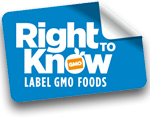 You are what you eat, right? Sadly, even that “all natural” diet, sometimes includes unhealthy additives you didn’t know you were eating. Got another cliche for you: Knowledge is power!
You are what you eat, right? Sadly, even that “all natural” diet, sometimes includes unhealthy additives you didn’t know you were eating. Got another cliche for you: Knowledge is power!
As health professionals and food enthusiasts, Byron and I are formally endorsing The California Right to Know Genetically Engineered Food Act.
Read on and click the links below to find out more about what is currently legally ending up on your plate and how we can improve the clarity of food labeling, and thus, the quality of our food.
California Right to Know
Sign the Pledge
A Simple Proposition for California in 2012
The California Right to Know Genetically Engineered Food Act is simple: The initiative would require food sold in retail outlets such as grocery stores (not including restaurants) to be labeled if it is produced with genetic engineering. In addition to this disclosure, genetically engineered foods are prohibited from being advertised as ‘natural.’
50 countries including the European Union, Japan and China, already label genetically engineered foods. California is leading the way on this important issue here in the United States and Label GMO is on the ballot for November.
We All Have a Right to Know What’s in Our Food
Consumers have a right to know what’s in the food we eat and feed our children, including whether food is genetically engineered. We all should be able to make informed choices, and have the ability to choose whether to buy genetically engineered food or not.
We Currently Eat Genetically Engineered Food, But We Don’t Know It
A genetically engineered food (also known as genetically modified organisms, or GMOs) is a plant or meat product that has had its DNA artificially altered by genes from other plants, animals, viruses, or bacteria, in order to produce foreign compounds in that food. This type of genetic alteration occurs in a laboratory and is not found in nature. Today, the majority of corn and soy grown in the U.S. is genetically engineered to withstand high doses of weed killer and pesticides. This corn and soy is found in countless processed foods such as cereals, baby foods, breads, chips, and many other products – even products that are labeled “natural”. The U.S. Food and Drug Administration (FDA) is currently considering approving a genetically engineered salmon that has been altered to promote faster growth. Some of our most important staple food crops are being fundamentally altered, but without proper labeling, we have no way of knowing which ones.
The Risk of Genetically Engineered Foods
Unlike the strict safety evaluations required for the approval of new drugs, the FDA does not require safety assessments of genetically engineered foods for human consumption. Studies show that genetically engineering food can create new, unintended toxicants and increase allergens, and other health problems. Experts around the world agree that by labeling genetically engineered food, we can help identify any adverse health reactions that these foods may cause.
 You are what you eat, right? Sadly, even that “all natural” diet, sometimes includes unhealthy additives you didn’t know you were eating. Got another cliche for you: Knowledge is power!
You are what you eat, right? Sadly, even that “all natural” diet, sometimes includes unhealthy additives you didn’t know you were eating. Got another cliche for you: Knowledge is power!





